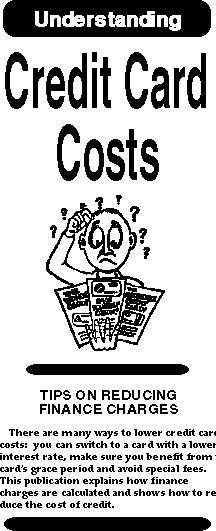Looking to reduce those pesky credit card finance charges? Well, look no further! We’ve got some great tips to help you lower those fees and save you some hard-earned money. Credit card finance charges can eat into your budget, but with a little know-how, you can take control of your finances and keep those charges to a minimum. In this article, we’ll walk you through some simple yet effective strategies for reducing credit card finance charges. So, let’s dive right in and start saving!
Tips for Reducing Credit Card Finance Charges
Credit card finance charges can quickly add up and become a burden on your financial wellbeing. However, with a little bit of knowledge and a proactive approach, you can take steps to reduce these charges and save yourself some money. In this article, we will explore various tips and strategies to help you minimize credit card finance charges and regain control of your finances. From understanding how finance charges are calculated to implementing practical strategies, we’ve got you covered. Let’s dive in!
1. Know how finance charges are calculated
Before we delve into tips for reducing credit card finance charges, it’s important to understand how these charges are calculated. Credit card finance charges are typically calculated based on your average daily balance and the annual percentage rate (APR) associated with your credit card.
The average daily balance is calculated by adding up the balances on your credit card for each day of the billing cycle and then dividing it by the number of days in the billing cycle. The APR is the interest rate you are charged for borrowing money on your credit card.
Understanding the grace period
It’s also important to understand the concept of a grace period. A grace period is the period of time during which you can pay your credit card balance in full without incurring any finance charges. Grace periods typically range from 21 to 25 days, but it’s crucial to check your credit card agreement to confirm the specific grace period for your card.
If you pay your balance in full by the due date each month, you can take advantage of the grace period and avoid paying any finance charges. However, if you carry a balance from month to month, the grace period may not apply, and finance charges will be applied to your outstanding balance.
2. Pay your balance in full every month
One of the most effective ways to reduce credit card finance charges is to pay your balance in full every month. By doing so, you can take advantage of the grace period and avoid paying any interest on your purchases. Here are a few tips to help you achieve this goal:
- Create a budget: Plan your expenses and allocate a specific amount for credit card payments in your monthly budget.
- Avoid unnecessary purchases: Differentiate between wants and needs to ensure you only spend on essential items.
- Track your spending: Regularly monitor your credit card transactions to keep a close eye on your spending habits and identify areas where you can cut back.
- Pay on time: Set up automatic payments or use reminders to avoid missing payment due dates and incurring late fees.
By paying your balance in full every month, you can not only avoid finance charges but also build a good credit history and avoid falling into a spiral of debt.
3. Negotiate a lower APR
If you find yourself unable to pay your balance in full each month, it may be worth negotiating a lower APR with your credit card issuer. A lower APR can significantly reduce the finance charges you incur on your outstanding balance. Here’s how you can approach negotiating a lower APR:
- Research other credit card offers: Look for credit cards with lower interest rates and use them as leverage during negotiations with your current credit card issuer.
- Highlight your payment history: If you have been a loyal customer and have consistently made your payments on time, emphasize this to your credit card issuer as it can strengthen your case for a lower interest rate.
- Consider balance transfer options: If your credit card issuer is unwilling to lower your APR, you may consider transferring your balance to a credit card with a lower interest rate. However, be cautious of any balance transfer fees that may apply.
Remember, the outcome of the negotiation depends on various factors, including your credit history, payment patterns, and the credit card issuer’s policies. It never hurts to ask, so gather your information and approach the negotiation with confidence.
4. Make extra payments
Another effective strategy for reducing credit card finance charges is to make extra payments whenever possible. By paying more than the minimum payment due, you can reduce your outstanding balance quicker and minimize the amount of interest that accumulates over time. Here’s how you can incorporate this strategy:
- Allocate extra funds: Whenever you have additional funds available, such as a tax refund or a bonus, allocate a portion of it towards your credit card payments.
- Pay bi-weekly: Instead of making one monthly payment, consider paying half the amount due every two weeks. This can result in an extra payment each year, speeding up your debt repayment process.
- Use windfalls wisely: If you receive unexpected income, such as an inheritance or a gift, use a portion of it to make a lump sum payment towards your credit card balance.
By making extra payments, you not only reduce the overall amount of interest you’ll pay but also shorten the time it takes to become debt-free.
5. Avoid cash advances
Cash advances from credit cards often come with high finance charges and should be avoided whenever possible. Unlike purchases, cash advances typically start accruing interest immediately, with no grace period. Here are a few alternatives to consider instead of cash advances:
- Emergency fund: Build an emergency fund for unexpected expenses, so you don’t have to rely on cash advances.
- Borrow from friends or family: Consider borrowing money from friends or family members in times of urgent financial need.
- Personal loan: Explore the possibility of obtaining a personal loan with a lower interest rate compared to cash advances.
It’s important to note that cash advances should be reserved for genuine emergencies when no other options are available.
6. Monitor your credit card statements
To ensure you’re not being charged incorrect finance charges or fees, it’s crucial to regularly monitor your credit card statements. By carefully reviewing your statements, you can identify any errors or unauthorized charges that may impact your finance charges. Follow these steps to monitor your credit card statements effectively:
- Review each transaction: Go through each transaction on your statement and verify its accuracy. Look out for any unfamiliar charges or discrepancies.
- Check interest rates: Take note of the interest rates charged for different transactions, ensuring they align with your credit card agreement.
- Report errors promptly: If you notice any errors or unauthorized charges, report them to your credit card issuer immediately for resolution.
By being proactive and promptly addressing any discrepancies, you can prevent unnecessary finance charges and maintain control of your credit card expenses.
7. Seek professional advice if needed
If you find yourself overwhelmed by credit card debt or unable to manage your finances effectively, it may be beneficial to seek professional advice. Credit counseling agencies and financial advisors can provide guidance tailored to your specific situation and help you develop a plan to reduce credit card finance charges. Here’s how professional advice can assist you:
- Debt consolidation: A professional can guide you through the process of consolidating your debts, potentially reducing your overall interest rates.
- Budgeting assistance: Professionals can help you create a realistic budget and provide strategies to manage your expenses effectively.
- Negotiation support: If negotiating with credit card issuers seems challenging, professionals can provide guidance and support during the process.
Remember that seeking professional advice is a proactive step towards regaining control of your finances and reducing credit card finance charges.
Closing Thoughts
Reducing credit card finance charges requires a combination of knowledge, discipline, and proactive measures. By understanding how finance charges are calculated, paying your balance in full, negotiating a lower APR, making extra payments, avoiding cash advances, monitoring your statements, and seeking professional advice when needed, you can take control of your credit card debt and achieve financial freedom. Implement these tips and start your journey towards a debt-free future today!
WHEN and HOW MUCH to Pay on Your Credit Card to Avoid Interest!
Frequently Asked Questions
Frequently Asked Questions (FAQs)
How can I reduce credit card finance charges?
One way to reduce credit card finance charges is by paying your balance in full each month. This avoids interest charges altogether.
Should I consider transferring my credit card balance?
Transferring your credit card balance to a card with a lower interest rate can be a good option to reduce finance charges. However, make sure to check for any balance transfer fees before making the decision.
Are there any other alternatives to reduce credit card finance charges?
Yes, you can try negotiating a lower interest rate with your credit card issuer. Contact them and explain your situation to see if they are willing to accommodate your request.
Is it helpful to set up automatic payments?
Setting up automatic payments ensures that you never miss a payment, which can help avoid finance charges caused by late payments. However, it’s important to monitor your account for any unexpected charges or errors.
Can I avoid finance charges by paying before the due date?
Generally, finance charges are applied when you carry a balance from one billing cycle to the next. If you pay your balance in full before the due date, you can avoid these charges.
Is it wise to reduce my credit card utilization ratio?
Yes, reducing your credit card utilization ratio can positively impact your credit score and potentially lower your interest rates. Aim to keep your utilization below 30% of your credit limit.
Are there any credit card rewards programs that can help reduce finance charges?
While credit card rewards programs do not directly reduce finance charges, you can use the earned rewards to pay for expenses, which ultimately reduces your overall credit card balance and potential finance charges.
Should I consider obtaining a personal loan to pay off credit card debt?
Taking out a personal loan to pay off credit card debt may be an option to consider, especially if the loan offers a lower interest rate than your credit card. However, assess the terms and conditions of the loan and the impact on your overall financial situation before deciding.
Final Thoughts
Reducing credit card finance charges is essential for maintaining financial stability. Firstly, one effective tip is to consistently make payments on time to avoid late fees and high interest rates. Secondly, paying more than the minimum amount due each month can help decrease the overall finance charges. Additionally, transferring balances to a low-interest card or negotiating a lower interest rate with the credit card issuer are also viable strategies. By following these tips, individuals can effectively reduce credit card finance charges and enhance their financial well-being.


